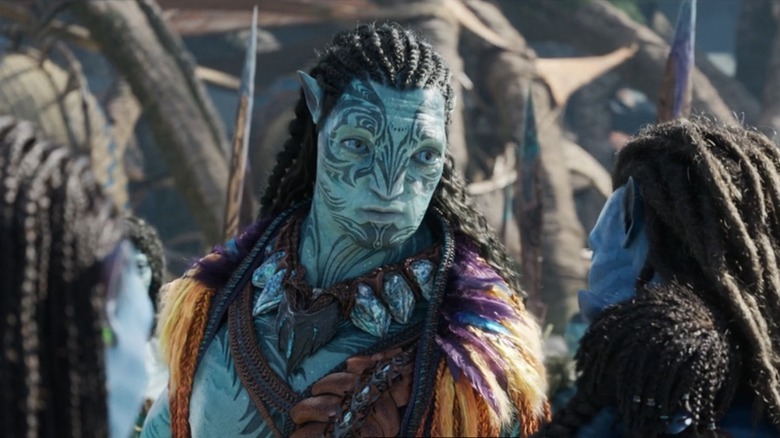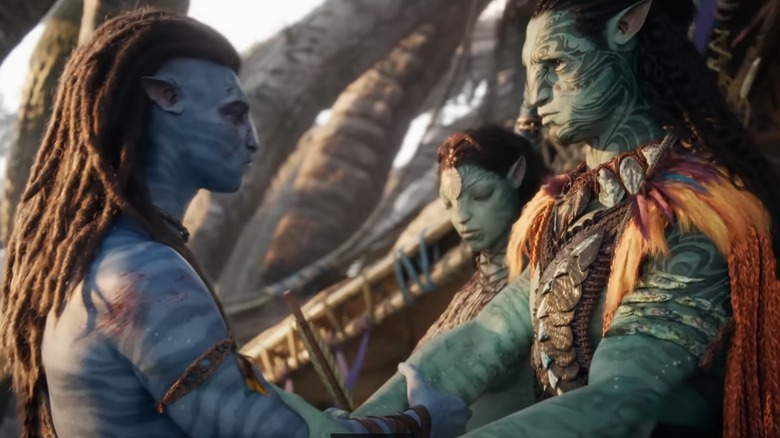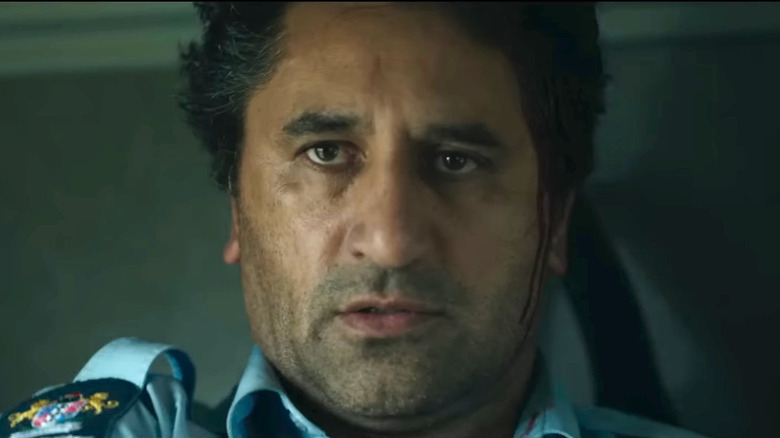Cliff Curtis Describes Exploring Indigenous Experience In Avatar: The Way Of Water As A Total 'Dream'
The "Avatar" series has long been criticized for its take on Indigenous culture, which — while ostensibly telling the story of a culture persecuted by white, predominantly male colonizers — nevertheless "others" the Na'vi culture and centers a white male protagonist. In 2010, CeaseFire Magazine called the original "a truly dangerous film," saying, "It is a constant reminder of the ways in which people of colour have been deprived of agency and thus their ability to tell their own story."
Producer James Cameron has been very clear about the origins of "Avatar." He told the Guardian in 2010 that the Lakota Sioux's experience with European colonization was "a driving force for me in the writing of 'Avatar.'" He also said (via Insider) in a legal statement meant to counter lawsuits claiming he stole the idea for "Avatar," "Europe equals Earth. The native Americans are the Na'vi. It's not meant to be subtle."
The sequel, "Avatar: The Way of Water," is designed to take some of those earlier criticisms into account; Collider notes that the more sophisticated character explorations result in more nuanced discussions of culture. Yet NBC News explains, "'Way of the Water' still falls back on conventional action-movie tropes, including a compulsive reiteration of colonial superiority and leadership even in a film devoted to exposing the evils of colonialism."
As part of making "The Way of Water" a more sensitive portrayal of a persecuted culture, the movie makes a point of drawing in traditions and cultural touchstones from different Indigenous cultures. It also makes more strides in representation. For example, the chief of the water-based Metkayina people is portrayed by actor Cliff Curtis, who is Māori, Te Arawa, and Ngāti Hauiti (per National Indigenous Times).
The Indigenous actor had positive, even spiritual experiences making 'The Way of Water'
Curtis plays Tonowari, a tribal leader with a family who agrees to take in Jake Sully (Sam Worthington), Neytiri (Zoe Saldana), and their children when they are being targeted by the military led by an Avatar version of Colonel Miles Quaritch (Stephen Lang) in "The Way of Water." The actor has said nothing but positive things about his experience in James Cameron's Pandora. In an interview provided to StageRightSecrets, Curtis said working on the film required imagination, vulnerability, and commitment to fulfill the vision imparted on the script page. "It's one of the purest forms of play that I've ever done in my career," he said.
He told Geek Culture, "It's very inspired by the Polynesian, Melanesian, Micronesian — the Oceanic cultures, so a lot of the art and the way of life. They're living in the ocean, the relationship with nature is very inspired by our traditional way of life. And I think it's a beautiful part of the movie that's most meaningful to me: that [the] way of life has been lost by most of humanity, and that we recreate this on Pandora to show how life used to be on this planet."
The actor also told Supanova that filming the movie involved filming on location and diving in Hawaii. Curtis said he had spiritual and surreal experiences under the water, which may have helped him find his character's core.
The actor said 'Avatar' and his previous film, 'Muru,' allowed him to explore his culture in different ways
Curtis is fresh off a well-reviewed turn as a New Zealand police sergeant with Māori and Te Urewera roots in the 2022 film "Muru." That film is loosely based on a real-life incident from 2007, in which government officials became convinced that Māori activists had become a domestic terrorist cell and conducted a massive raid to arrest them. His character, Taffy, is forced to reckon with both sides of the conflict, thanks to his background, his profession, and a strong sense of justice. This means that his most recent portrayal in the second "Avatar" film is the second within a short timeframe in which he gets to explore his relationship to his own culture more fully.
"I started acting like 30 years ago and I never could have imagined that the landscape of my career might look like this someday," the actor told The Hollywood Reporter, noting that "Muru" is more grounded in his real-life origins. "And then I've got 'Avatar: The Way of Water,' which is like a whole other galaxy away, in both its story and the way it's made. But what's interesting is that the two films are kind of connected by exploring things around the indigenous experience. So, for me, being able to do that from these two very different points of view — it's a dream," he said.
And while the critics are still out there — Refinery29 called the "Avatar" sequel "a gross reimagining of colonialism," for example — "Avatar: The Way of Water" is still doing so well in theaters that the entertainment industry watchers think it'll beat "Titanic" at the box office with a total worldwide take of up to $2.3 million (via The Hollywood Reporter). Hopefully, the Indigenous elements that do exist (like Curtis himself) can continue to provide some positive representation in the film franchise going forward.


